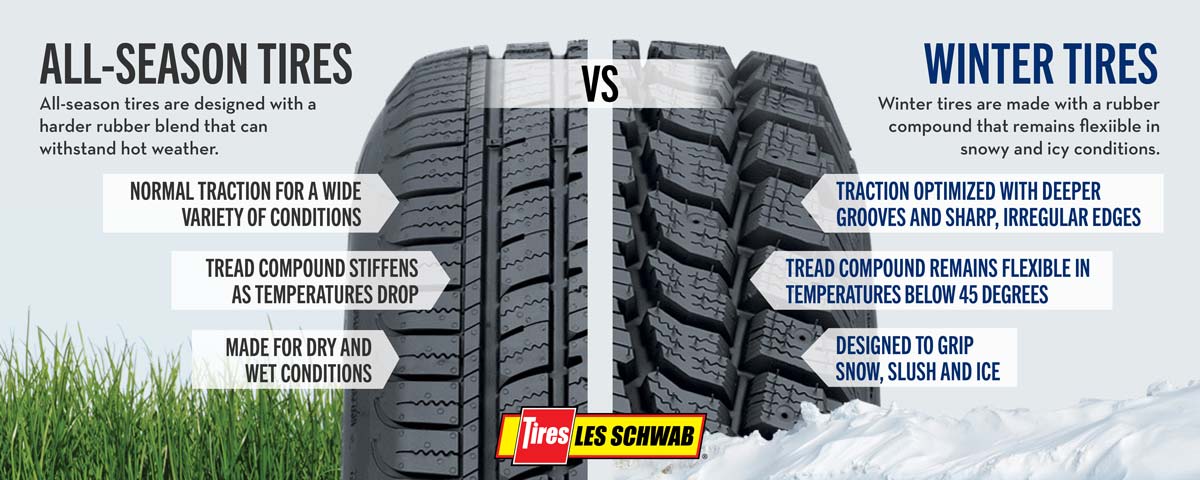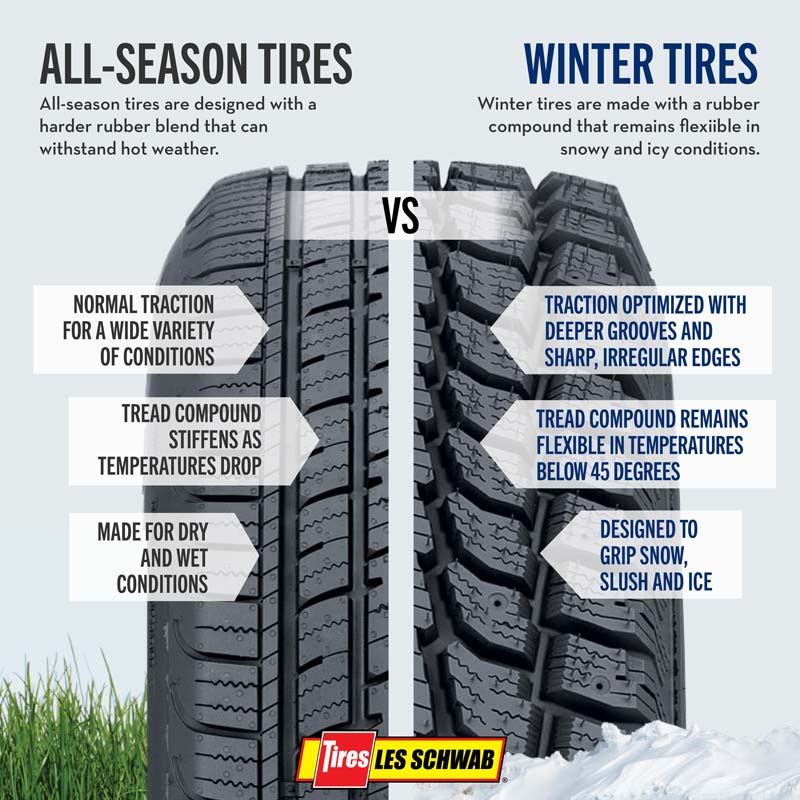Should You Drive on Winter Tires in the Summer?
Depending on where you’re driving, it’s possible to run into rain, sleet, snow, and sunshine on the same trip. Having a dedicated set of snow tires for winter driving can help keep you safe. But when those winter tires are nearing the end of their useful tread life, or your spring, summer, and fall tires don’t have enough tread, is it okay to keep using your winter tires all year long? The answer is “no.” Here are the reasons why.
Why You Shouldn’t Use Winter Tires in Summer
Driving on winter tires in the summer can affect your safety and wallet. The special rubber compound that makes them flexible in freezing temperatures also makes them wear out much faster in warmer weather. Plus, the higher rolling resistance of the deeper tread means you’ll reduce your MPG, spending more on gas. And because winter tires are not designed for cornering and acceleration on hot roads, it could impact vehicle control.
Additionally, depending on what state you are driving in, there are specific restrictions when you can use some snow tires outside winter months. Read more about winter tire restrictions.
What are Winter Tires?
Les Schwab winter or snow tires are specifically designed to help you stay in control on snow and ice-covered roads. A special rubber that helps grip the road better than summer or all-season tires when temperatures drop below 40º F is used to ensure the tread stays flexible in freezing temperatures. Plus, the deep, wide, and jagged tread found in winter tires helps maintain traction while channels move precipitation away from the tires. Additionally, some winter tires come with or can have studs added to the tread. These small pieces of metal pierce the ice and snow to provide extra traction. Please note, there are specific dates when studded tires must be removed in each state.
In comparison, all-season tires are made for dry and wet conditions outside winter months. They are great nine months out of the year, but do not remain as flexible at colder temperatures. This means you could have less control when driving on icy roads.


Winter Tires Can Wear Faster in Warm Temperatures
Winter tires are designed for traction, not longevity. As outside temperatures rise with the season, the pavement heats up as well. The tread designed for colder temperatures cannot withstand heat buildup, reducing tread life.
It Will Cost You, Not Save You Money
It might seem like a way to save money, but running winter tires in the summer won’t keep money in your wallet. Instead, you’ll spend more at the pump with a reduction in fuel efficiency thanks to deep tread and wide grooves. Plus, you’ll wear those tires down faster, meaning you’ll need a new set of snow tires sooner than expected.
Here’s another money- and time-saving tip. Mount your winter and all-season tires on separate wheels. You’ll save time when you bring them in to Les Schwab for your biannual changout. We’ll even do it for free when you have Les Schwab tires. Just be sure those wheels are the right size and fit your vehicle’s bolt pattern. The specific lug pattern for any vehicle is a measurement from one wheel stud to another, depending on how many lugs are equipped on your vehicle. Les Schwab has the wheels you need for your car or truck.
You’ll Experience Traction and Handling Issues
All-season tires are great for spring, summer, and fall driving. Winter tires are not. Using those tires outside colder months can result in a reduction in cornering and braking performance. Plus, if you do use your winter tires in the summer, the tread will wear more quickly. That can affect how well they channel snow, slush or water and maintain grip in colder temperatures.
Different Tire Choices To Fit All Seasonal Changes
As winter ends and temperatures steadily rise, it’s time to replace your winter tires with all-season or summer tires. At Les Schwab, we recommend swapping back to your all-season or summer tires when nighttime temperatures are consistently 50º F or when you do not plan to drive on snow or ice-covered roads. As rainy weather returns in the spring, those all-season tires will work better and help reduce your risk of hydroplaning.
Swapping Tires Can Be Easy and Free
Schedule a seasonal changeout appointment and bring your second set of Les Schwab tires and/or wheels with you. If you bought those tires at Les Schwab, and have each set mounted to their own wheels, we’ll change them out for free.
Not sure what to do with your off-season tires when they’re not on your vehicle? We may be able to store them at select locations. If you have room in your garage and don’t mind the mess, we have some tips to help you properly house those tires.
Talk to the Safety Pros at Les Schwab
There are many tires designed for specific seasons and driving conditions. Choosing the right option can save you money and deliver peace of mind with added safety. Stop by your local Les Schwab and our pros will help you decide on the right tires for your driving needs, including winter and all-season tires.
Schedule An Appointment
